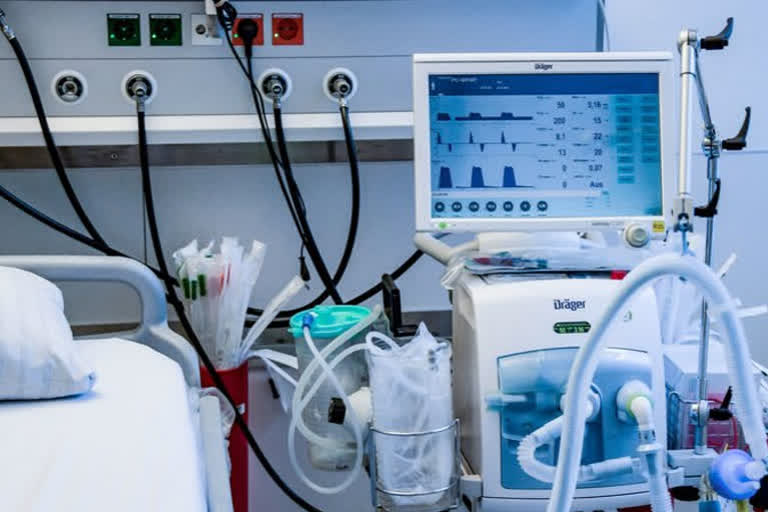Hyderabad: With COVID-19 sweeping across the world, the demand for ventilators has increased tremendously. Leading Indian medical and technology companies are competing to manufacture them for domestic use.
Many researchers have submitted their projects to the Indian Council of Medical Research for approval of their design. The main concern of these researchers is to design the breathing aid at a cheaper cost.
The novel coronavirus attacks the upper respiratory tract, making it difficult to breathe. Consequently, 3 per cent of the nCoV infected need ventilator support.
Read: Tamil Nadu start-up prepares low-cost ventilator, seeks ICMR approval
According to the Union Ministry of Health, 60,000 ventilators are currently available in India. Of these, less than 10,000 are in state-run hospitals. Presently, it is estimated that India needs 1.10 to 2.20 lakh ventilators.
Experts claim that we can produce up to 5,500 per month if spare parts were imported as usual. Domestically, 2,700 ventilators were manufactured in February and 5,580 in March.
As per the medical experts, India aims to achieve a monthly production capacity of 50,000 units by May. The cost of a domestic ventilator lies between Rs 5,00,000 to 7,00,000 while the imported ones cost Rs 11,00,000 to 18,00,000.
Read: Haryana's NIT professor builds cheapest ventilator to save COVID-19 patients
Though, there are two types of ventilators, but Microprocessor-based third-generation ventilators are extensively used during COVID-19 treatment. These kinds of ventilators are largely used in ICUs of private hospitals.
Similarly, Artificial Manual Breathing Unit or Bag Valve Mask ventilators are also useful in times of emergency. Also called Ambu Bag, these ventilators are quite economical. They have a self- inflating bag, a hand-held device to provide positive pressure ventilation to patients. With the availability of compressor machines, they can be mechanically operated too.
BEL, BHEL and Mahindra & Mahindra have teamed up with Skanray, which has a monthly production of 2,000 ventilators. The production capacity will be increased to 30,000 by May. Maruti Suzuki India Limited is ready to partner with AgVa Healthcare. At present, efforts are underway to increase the production capacity of the AgVa units from 400 to 10,000.
Various technical, medical and educational institutions in the country including DRDO and Indian Railways have come forward to avert the crisis.
They have designed ventilator samples using advanced technology. Specially DRDO is aimed at producing low cost, high volume ventilators. While several models have been designed, some are already being manufactured.
Sree Chitra Tirunal Institute for Medical Sciences and Technology has developed a ventilator model using Ambu Bag technology. With the approval of the Department of Science and Technology, Government of India, it has signed an agreement with Wipro 3D for ventilator production.
Hyderabad-based NextByte Technologies has manufactured an electric powered device to operate the Ambu Bag units. It is priced at INR 4,000.
Rajiv Chauhan, assistant professor at PGIMR Chandigarh, has designed a similar automated Ambu Bag unit. Mahindra & Mahindra has also designed a sample Ambu Bag ventilator.
Read: DRDO to produce 5,000 ventilators to treat coronavirus
India’s Defense Research and Development Organization has unveiled a new ventilator model in March. With the help of other industries, DRDO is going to manufacture 5,000 units. Indian Railways has designed a low-cost ventilator model named Jeevan at Rail Coach Factory, Kapurthala. Without the compressor, it is priced at INR 10,000. Railway officials said that they would produce 100 ventilators monthly once they get ICMR approval.
IIT Hyderabad-incubated startup developed a low-cost ventilator called Jeevan Lite using the Internet of Things. Its price can be anywhere up to INR 1,00,000. Together, IIT Roorkee and AIIMS Rishikesh have developed a portable ventilator named Prana-Vayu. The model was demonstrated to 450 industry experts. It is available for INR 25,000.
IIT Dhanbad engineers have developed a special adapter model which enables two people to use a ventilator simultaneously. This model will be made on-demand. The adapter prototype was handed over to Pataliputra Medical College & Hospital.
A private company in Gujarat’s Rajkot has developed a ventilator named Daman-1. It was successfully tested on a COVID-19 patient. The Gujarat state government has approved the manufacture of this ventilator which costs less than INR 1,00,000.



